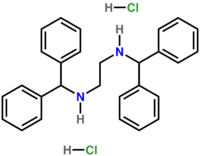AMN082
AMN082
 |
| Names |
| IUPAC name
N,N'-dibenzhydrylethane-1,2-diamine dihydrochloride |
| Identifiers |
| |
97075-46-2  N N |
| 3D model (Jmol) |
Interactive image
Interactive image |
| ChemSpider |
9873115  Y Y |
| ECHA InfoCard |
100.163.413 |
| PubChem |
11698390 |
InChI=1S/C28H28N2.2ClH/c1-5-13-23(14-6-1)27(24-15-7-2-8-16-24)29-21-22-30-28(25-17-9-3-10-18-25)26-19-11-4-12-20-26;;/h1-20,27-30H,21-22H2;2*1H  Y YKey: YRQCDCNQANSUPB-UHFFFAOYSA-N  Y Y
|
C(NCCNC(c1ccccc1)c2ccccc2)(c3ccccc3)c4ccccc4.Cl.Cl Cl.Cl.N(CCNC(c1ccccc1)c2ccccc2)C(c3ccccc3)c4ccccc4
|
| Properties |
| |
C28H30Cl2N2 |
| Molar mass |
465.4572 |
Except where otherwise noted, data are given for materials in their standard state (at 25 °C [77 °F], 100 kPa). |
 N verify (what is N verify (what is  Y Y N ?) N ?) |
| Infobox references |
|
|
AMN082 (N,N'-dibenzhydrylethane-1,2-diamine dihydrochloride) is a selective metabotropic glutamate receptor 7 (mGluR7) allosteric agonist.[1][2] It mimics the effect of glutamate. AMN082 is the first selective mGluR7 agonist and has expanded the potential array of research opportunities on the effects of mGluR7 in the CNS.
Significance
The two main types of glutamate receptors are ionotropic receptors and metabotropic receptors. Ionotropic receptors (iGluRs) are fast-acting ligand-gated ion channels and include AMPA, Kainate and NMDA. Metabotropic receptors are G-protein coupled receptors that mediate slower, longer-lasting effects through second messenger systems and are responsible for other neuronal functions that are not typically controlled by iGluRs. mGluRs are split into 3 separate groups (Group I, Group II, Group III) based on pharmacological profile, sequence homology, and preferred signal transduction pathway. mGlur7 is a member of Group III, the least studied of the groups. The discovery of AMN082 will serve as a useful pharmacological tool to expand research on Group III mGluRs.
References
|
|---|
|
Receptor
(ligands) | | AMPA | |
|---|
| | NMDA |
- Antagonists: Competitive antagonists: AP5 (APV)
- AP7
- CGP-37849
- CGP-39551
- CGP-39653
- CGP-40116
- CGS-19755
- CPP
- LY-233,053
- LY-235,959
- LY-274,614
- MDL-100,453
- Midafotel (d-CPPene)
- NPC-12,626
- NPC-17,742
- PBPD
- PEAQX
- Perzinfotel
- PPDA
- SDZ-220581
- Selfotel; Noncompetitive antagonists: ARR-15,896
- Caroverine
- Dexanabinol
- FPL-12495
- FR-115,427
- Hodgkinsine
- Magnesium
- MDL-27,266
- NPS-1506
- Psychotridine
- Zinc; Uncompetitive pore blockers: 2-MDP
- 3-HO-PCP
- 3-MeO-PCE
- 3-MeO-PCMo
- 3-MeO-PCP
- 4-MeO-PCP
- 8A-PDHQ
- 18-MC
- α-Endopsychosin
- Alaproclate
- Amantadine
- Aptiganel
- Arketamine
- ARL-12,495
- ARL-15,896-AR
- ARL-16,247
- Budipine
- Conaridine
- Delucemine
- Dexoxadrol
- Dextrallorphan
- Dieticyclidine
- Diphenidine
- Dizocilpine
- Ephenidine
- Esketamine
- Etoxadrol
- Eticyclidine
- Fluorolintane
- Gacyclidine
- Ibogaine
- Ibogamine
- Indantadol
- Ketamine
- Ketobemidone
- Lanicemine
- Loperamide
- Memantine
- Methadone (Levomethadone)
- Methorphan (Dextromethorphan
- Levomethorphan)
- Methoxetamine
- Methoxphenidine
- Milnacipran
- Morphanol (Dextrorphan
- Levorphanol)
- NEFA
- Neramexane
- Nitromemantine
- Nitrous oxide
- Noribogaine
- Norketamine
- Orphenadrine
- PCPr
- Pethidine (meperidine)
- Phencyclamine
- Phencyclidine
- Propoxyphene
- Remacemide
- Rhynchophylline
- Rimantadine
- Rolicyclidine
- Sabeluzole
- Tabernanthine
- Tenocyclidine
- Tiletamine
- Tramadol
- Xenon; Glycine site antagonists: 4-Cl-KYN (AV-101)
- 5,7-DCKA
- 7-CKA
- ACC
- ACEA-1011
- ACEA-1328
- AV-101
- Carisoprodol
- CGP-39653
- CNQX
- DNQX
- Felbamate
- Gavestinel
- GV-196,771
- Kynurenic acid
- Kynurenine
- L-689,560
- L-701,324
- Licostinel (ACEA-1021)
- LU-73,068
- MDL-105,519
- Meprobamate
- MRZ 2/576
- PNQX
- ZD-9379; NR2B subunit antagonists: Besonprodil
- CERC-301 (MK-0657)
- CO-101,244 (PD-174,494)
- Eliprodil
- Haloperidol
- Ifenprodil
- Isoxsuprine
- Nylidrin
- Ro8-4304
- Ro25-6981
- Traxoprodil; Polyamine site antagonists: Arcaine
- Co 101676
- Diaminopropane
- Diethylenetriamine
- Huperzine A
- Putrescine
- Ro 25-6981; Unclassified/unsorted antagonists: Bumetanide
- Chloroform
- Cyclopropane
- D-αAA
- Diethyl ether
- Enflurane
- Ethanol
- Flufenamic acid
- Flupirtine
- Furosemide
- Halothane
- Isoflurane
- Metaphit
- Methoxyflurane
- Niflumic acid
- Pentamidine isethionate
- Piretanide
- Toluene
- Transcrocetin (saffron)
- Trichloroethane
- Trichloroethanol
- Trichloroethylene
- Xylene
|
|---|
| | Kainate | |
|---|
| | mGlu1 | |
|---|
| | mGlu2 | |
|---|
| | mGlu3 | |
|---|
| | mGlu4 |
- Antagonists: CPPG
- MAP4
- MPPG
- MSOP
- MTPG
- UBP-1112
|
|---|
| | mGlu5 | |
|---|
| | mGlu6 |
- Antagonists: CPPG
- MAP4
- MPPG
- MSOP
- MTPG
- UBP-1112
|
|---|
| | mGlu7 |
- Antagonists: CPPG
- MAP4
- MMPIP
- MPPG
- MSOP
- MTPG
- UBP-1112
|
|---|
| | mGlu8 |
- Antagonists: CPPG
- MAP4
- MPPG
- MSOP
- MTPG
- UBP-1112
|
|---|
|
|---|
|
Transporter
(blockers) | |
|---|
|
Enzyme
(inhibitors) | |
|---|
|
| Others | |
|---|
|
See also: GABAergics • GHBergics • Glycinergics |

 . PMID 18155073.
. PMID 18155073.